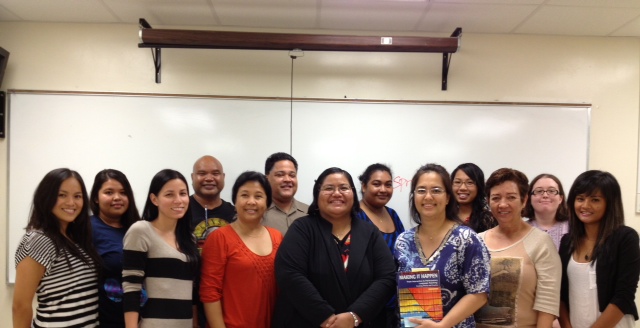


Wednesday, February 20, 2013
"Some teachers aren't allowed to teach English"
A friend of mine shared a story with me a few days ago. She was having a conversation with an acquaintance of hers named "Mary." Mary states, matter-of-factly, that "Some teachers, especially those who are not native English speakers, shouldn't be allowed to teach English." Wow! This statement got my blood boiling. Additionally, Mary commented on how "Many of the teachers on Guam have thick accents, so how do they expect to teach the proper pronunciation of words." How ignorant can this person be to say who is qualified to teach English. I have many friends who are non-native English speakers who speak the language better than I do...and I'm a native English speaker. I guess "Mary" is talking through a prescriptive point of view and is entitled to her own opinion. She may be one of those people that feel "The English language is better than the rest." However, as a linguistic student studying to be an ESL teacher, I see language through a descriptive view and there is no such thing as a "better" language.
Subscribe to:
Post Comments (Atom)




The thick accent part did make me chuckle. What person doesn't have an accent? Beside that fact, what is actually seen as an 'American' accent? I'm from the southeast, so I do have a slight southern accent. Should I not be allowed to teach English because I don't have a standard accent? I personally don't think so.
ReplyDeleteBeing I'm from the south, I actually say some words differently than most people. This is actually the case for a lot of American accents. The best example I can think of is the word pecan. Most would say the word as, roughly, 'Pea-Con'. I say it as, 'Pea-Can'. Both are correct pronunciations of the same word, however, 'Pea-Con' is probably in more wide usage. So if I taught a ESL class how to pronounce pecan in the way I say it, it would be seen by Mary as wrong.
I think an accent makes a language alive and anyone who is fluent or is a native speaker could and should be allowed to teach English no matter how thick their accent is.
-Kaylynne
Let me join you guys. I think all the accents of English contribute to it to have beccome the global language. Yet, this is something that is commonly looked over by those sweet ignorant Marys. Being a non-native speaker, and coming out of a former British colony, I have an accent! After having encountered a lot of Marys outside my country, at some point, I literally felt sad to have that accent of mine. But, I am not getting rid of it because it makes me who I am and where I come from. It would be nice of those Marys if they knew a little bit more about their self-claimed native English language. Only if they did.
ReplyDeleteExactly Kaylynne and Lwin! The Marys of the world are simple ignorant and snobby creatures of our earth.
DeleteI have heard comments like Mary's before. I have always had the perspective that everyone is entitled to their own opinion. What bothers me about her comment is that our country is made of so many different nationalities, cultures, and languages. These differences are what make the United States special. We are not one particular nationality but many and we co-exists together in this country. If all of us spoke the same way or dressed the same way I don't think we would be the country we are. Just something to think about.
ReplyDeleteLadies, I was thinking the same thing before I was enrolled for the class. I thought that English should be taught to non-English speakers by English native speakers. But this was before I understand the whole meaning of language acquisition. I have to admit, I thought I was crazy for enrolling in this course because I thought that to be able to teach English to non-English speakers one must be good and fluent in English.
ReplyDeleteNow through these discussion, I have come to understand that anyone and everyone can be able to teach English to non-English speakers.I don't think I was ignorant and snobby like the Marys.
This comment has been removed by the author.
DeleteOh no Beauty, far from it. Just a little FYI on "Mary", she's a 1st year teacher and she's a native English speaker...that's why I called her "snobby" and "ignorant." She believes that the English language is far superior than any other language.
DeleteI have heard those comments before as well. It is the passion, technique, collaboration, strategies, etc. that matter when teaching, not the accent. If anything, ESL teachers who have a native language other than English may have a better understanding of what the students are feeling and experiencing.
ReplyDelete